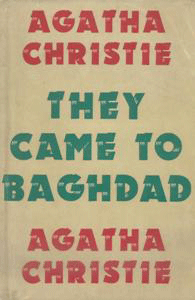Positioned between World War II and the Cold War, “They Came to Baghdad” (1951) is a contender for Agatha Christie’s elite spy adventure novel. It’s a spiritual companion piece to the later “So Many Steps to Death” (1954), but the plot is more plausible here, so I like this one slightly more.
Happy high stakes
As usual in a world-hopping Christie adventure, we focus on a young woman who is initially in over her head but becomes braver as life-or-death situations pile up. Victoria Jones is fired for making fun of her boss – on top of being a lousy typist – but then meets a dashing young man in a London park.
Throwing her cards in, Victoria resolves to follow him to Baghdad. Meanwhile, we follow other people on their way to the Iraqi capital. An international group generally siding with freedom and capitalism is investigating another international group aiming for central planning and Communism.

“They Came to Baghdad” (1951)
Author: Agatha Christie
Genre: Spy adventure
Setting: London and Iraq, 1951
“Baghdad” has believable stakes for the globe, whereas “So Many Steps” is at least a few steps over the top. Yet “Baghdad” is the more chipper book because Victoria – unlike Hilary – is not suicidal. Victoria is perpetually at a low ebb — she’s staying in a hotel along the Tigris River with her bill steadily piling up – but she doesn’t stay down.
Christie balances the serious intrigue with humor. A spy named Carmichael finds dirt on the bad guys in China or thereabouts. With maguffin (papers about nuclear bombs) in hand, he tries to get to Baghdad. It’s scary to learn the bad guys have killed innocent people who simply resemble Carmichael.
Meanwhile, the games of Victoria – who is excellent at white lies but not complicated ones – become humorous. In order to find safety, she says she is Victoria Pauncefoot Jones, the niece of an archaeologist working a dig a couple hours outside the city. By an amusing contrivance (Christie is allowed one in this fun novel), Dr. Pauncefoot Jones is absent-minded. His actual niece is named Venitia, but he can’t remember that.
Great travelogue
“Baghdad” is also a great travelogue. As fans know, Christie was fascinated by the Middle East, setting many stories there. This one gives an excellent portrait of Baghdad. It’s not all glowing; the regularity with which people spit on the sidewalk is my big takeaway. Also, the thoroughfares and bumpy roads are terrifying, giving way to equally scary empty lots off the main drag.
While Iraq is more primitive than England in measurable ways, it’s a thriving and colorful place. This novel is a sobering reminder of what Baghdad was before the War on Terror. Victoria is never safe, but that’s because of the game she is caught up in. There’s no need for her to fear sudden drone bombings, or that a random person will be a kidnapper.
Christie shows respect for the Moslem faith in the final pages. Speaking through her good-guy characters, she’s careful to note that she’s not a Communist, but she hopes for an interlinked world community devoted to peace.
Grand world-building
This is a bizarre comparison, but “Baghdad” reminds me of the Marvel Cinematic Universe’s grand story. Christie presents two sides in a global conflict but doesn’t mention real countries or groups when describing the villains.
The author writes of the Communists’ interest in a race of ruling Supermen. She never invokes Nazis, even though no one would blame her for inventing a resurgent Nazi Party. Similarly, the MCU invents fictional countries and villainous groups.
As with wide-audience tentpoles, “Baghdad” is a Pollyanna novel, built around an assumption that good and evil can be cleanly defined and demarcated. When an author does that, she has to provide enough details about the conflict for us to buy into it. Yet she can’t make it so complicated that we can’t follow the events.
In “They Came to Baghdad,” Christie beautifully serves all the necessary masters.
Sleuthing Sunday reviews an Agatha Christie book or adaptation. Click here to visit our Agatha Christie Zone.


